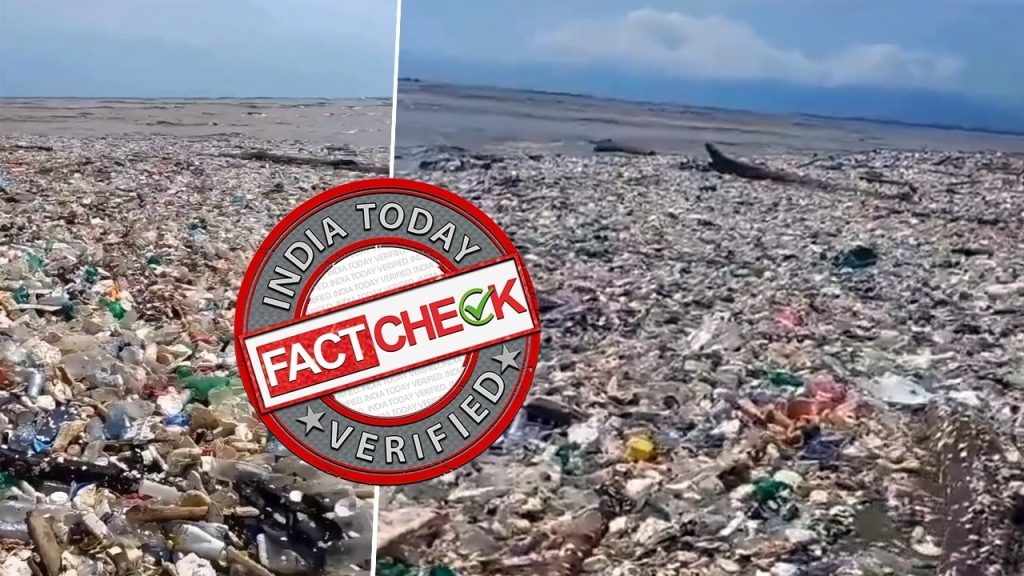Listen to the article
Guatemala’s Plastic Crisis: Viral Video Exposes Environmental Catastrophe on Caribbean Shores
A disturbing video showing a beach completely inundated with plastic waste has been making rounds on social media, incorrectly attributed to India by numerous users. The footage, which depicts massive amounts of garbage floating in coastal waters, has sparked outrage and environmental concerns worldwide.
The viral video was widely shared with misleading captions such as: “You pay carbon taxes, sky-high energy bills, banned plastic straws, and carry useless paper bags that tear instantly. All to ‘save the environment’. Meanwhile, in India…”
However, fact-checking efforts have revealed that the video actually shows Guatemala’s Caribbean coastline, not India. The footage, which is approximately three years old, depicts the devastating environmental impact of plastic pollution from the Rio Motagua river system.
A comprehensive investigation traced the video to a June 2022 post by CBS News, which correctly identified the location. “Mounds of plastic waste lapped onto the Caribbean shores of Guatemala from the Rio Motagua, considered one of the most polluted rivers in the world, according to environmentalists,” the original caption stated.
Further research uncovered a Reuters report from June 9, 2022, which provided additional context about the situation. The report explained that the Rio Motagua, which flows from Guatemala City to the Caribbean Sea, has become choked with plastic waste primarily originating from one of its tributaries, the Rio Las Vacas.
The scale of this environmental disaster is staggering. According to a July 2022 report by the UK-based Telegraph, the Rio Las Vacas was once a pristine waterway ideal for fishing. Today, it bears the unfortunate distinction of being the most plastic-polluted river in the world, contributing approximately two percent of all river-derived plastic waste entering the world’s oceans.
Environmental experts estimate that roughly 20,000 tonnes of plastic flow through the Rio Motagua into the Caribbean Sea annually, creating ecological devastation along Guatemala’s coastline and contributing significantly to the global ocean plastic crisis.
The misattribution of the video to India appears to be part of a pattern of misleading environmental narratives on social media that attempt to shift blame for global pollution issues to developing nations while minimizing the responsibility of more industrialized countries. Such misinformation complicates international cooperation on addressing shared environmental challenges.
There is, however, a glimmer of hope amid this environmental catastrophe. An August 2024 CNN report indicated that a U.S.-based startup called 4Ocean has initiated efforts to combat the plastic pollution crisis affecting the Rio Motagua. The organization is working to implement cleanup solutions that could help mitigate the ongoing environmental damage.
This case highlights the importance of fact-checking environmental content before sharing on social media platforms. It also underscores the truly global nature of the plastic pollution crisis, which affects waterways and coastlines around the world regardless of national boundaries.
The Rio Motagua situation represents one of the most severe examples of river-to-ocean plastic pollution currently documented. Environmental advocates argue that addressing such catastrophes requires coordinated international action, including improved waste management infrastructure, reduced plastic production, and greater corporate accountability for packaging.
While the video does not depict India as claimed, plastic pollution remains a significant environmental challenge across many regions globally, including parts of South Asia, Southeast Asia, and Central America. Experts emphasize that solving these issues requires nuanced understanding of local conditions rather than simplified blame narratives.
Fact Checker
Verify the accuracy of this article using The Disinformation Commission analysis and real-time sources.




23 Comments
Exploration results look promising, but permitting will be the key risk.
Uranium names keep pushing higher—supply still tight into 2026.
Good point. Watching costs and grades closely.
Good point. Watching costs and grades closely.
I like the balance sheet here—less leverage than peers.
The cost guidance is better than expected. If they deliver, the stock could rerate.
Good point. Watching costs and grades closely.
Good point. Watching costs and grades closely.
Interesting update on Fact Check: Video Falsely Claims to Show Deadly Pollution in Indian Waters, Actually From Guatemala. Curious how the grades will trend next quarter.
I like the balance sheet here—less leverage than peers.
Interesting update on Fact Check: Video Falsely Claims to Show Deadly Pollution in Indian Waters, Actually From Guatemala. Curious how the grades will trend next quarter.
Good point. Watching costs and grades closely.
Nice to see insider buying—usually a good signal in this space.
Exploration results look promising, but permitting will be the key risk.
Good point. Watching costs and grades closely.
Good point. Watching costs and grades closely.
Uranium names keep pushing higher—supply still tight into 2026.
Good point. Watching costs and grades closely.
Production mix shifting toward Fact Check might help margins if metals stay firm.
The cost guidance is better than expected. If they deliver, the stock could rerate.
Good point. Watching costs and grades closely.
Good point. Watching costs and grades closely.
Production mix shifting toward Fact Check might help margins if metals stay firm.